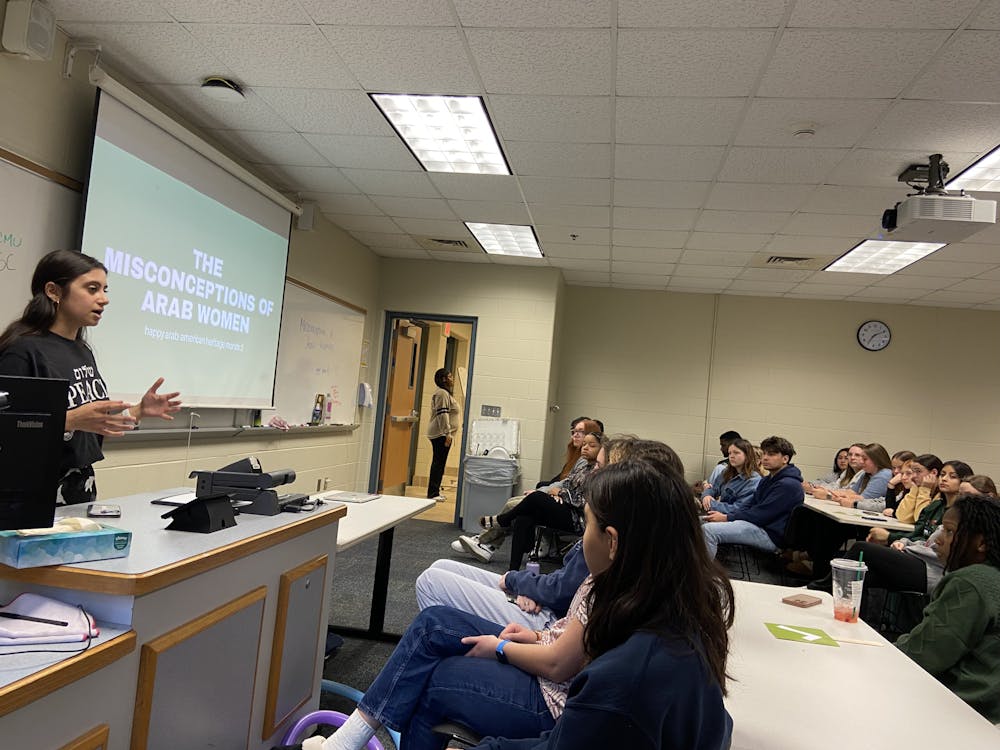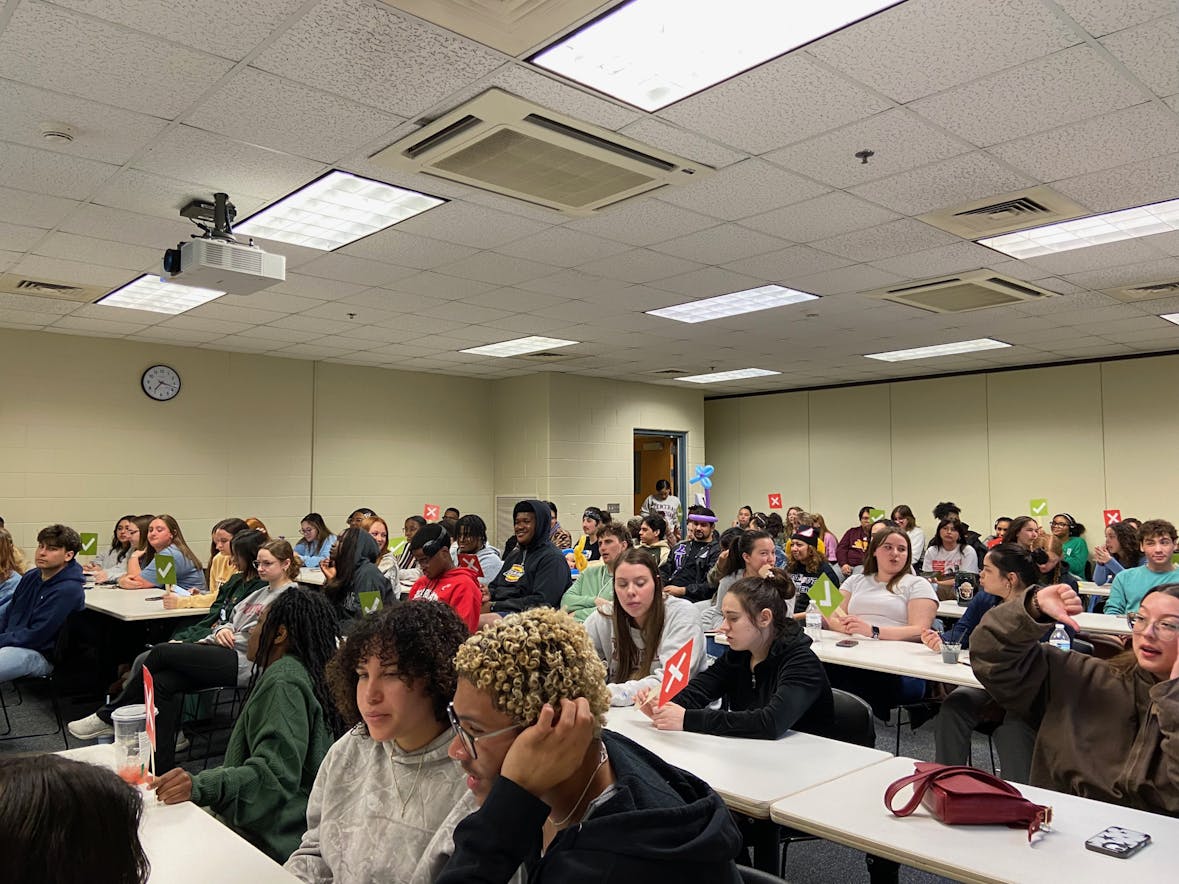CMU speaker challenges stereotypes about Arab women

Lena Kandah, a junior at CMU, said Arab women are often misunderstood and misrepresented especially in the media.
Kandah led a presentation titled “The Misconceptions of Arab Women" on April 21 in Kulhavi Hall Room 146 as part of the university’s ongoing Arab American Heritage Month programming.
Approximately 90 students attended the discussion, according to Alfred Harper, the Assistant Director for Multicultural Student Education in the Multicultural Academic Student Services (MASS) office. The event aimed to educate attendees and debunk common myths surrounding Arab women and their culture.
Differences between Arab and Muslim

Kandah opened the event by asking participants to respond to a series of statements, encouraging them to raise the “true” or “false” signs in their hands before she broke down the facts behind each one.
Religion was one of the first topics Kandah discussed. She asked students if only 55% of Arabs identified as Muslim, and after students raised their signs, she revealed the percentage is much higher - around 94%.
She said that Arabs only make up about 23% of the worldwide Muslim population. Many Muslims live in Southeast Asia, with Indonesia being the country with the largest Muslim population globally.
Kandah said that one of the most common misconceptions is the idea that “Arab” and “Muslim” are interchangeable terms, a confusion that often stems from media portrayals of countries like Iran and Afghanistan.
“Those are technically not Arab countries, meaning they don't speak Arabic,” Kandah said. “They hold a different ethnic identity, but you hear them a lot in the news. They're kind of lumped together, and they do have some pretty strict laws in regards to head coverings.”
Rules around hijab
Kandah said another frequently misunderstood topic is the hijab, or head coverings. She explained that not all Arab women wear a hijab and that the decision to do so is a personal choice, often religious, cultural or both, but not universally mandated.
“Muslim women wear the hijab or cover their head based on their own personal vindication,” Kandah said. “It is not a requirement of the faith to wear one, nor is it a requirement of any Middle Eastern woman to wear one. That is a choice that they make for themselves.”
She said strict laws around hijab enforcement in non-Arab countries are often tied to the government, not Islam itself, yet they are frequently used to generalize or misrepresent Arab and Muslim communities.
“It’s important to understand whether laws are brought forth because of the people or because of the government,” Kandah said. “These laws that you might read about sound extreme, and that’s because they are, and that’s due to the government. That is not reflective of Islam as a whole.
“Not all Muslims are Arab, and not all Arabs are Muslim."
Women in Arab countries
Kandah also addressed misconceptions about Arab women being young brides or mothers with limited autonomy. She provided data from the United Nations, stating that the average number of births per woman in the Middle East was 2.6 in 2023, a significant drop from 4.9 in 1990. Seven of the top 15 nations experiencing a fertility decline are Arab countries.
“So all of that shows us that the misconception here is wrong,” Kandah said. “They are having less children, they are choosing their own husbands and they're getting married later in life.”
She also refuted claims that Arab women are less educated or inactive in society. Kandah presented data showing that Arab women are attending universities at higher rates than men.
She said in Qatar, women outnumber men in higher education by more than six to one, and in Saudi Arabia, women make up 72% of science graduates.
Another misconception is the idea that Arab women are only able to pursue “pink collar” jobs, such as teaching, cosmetology or childcare.
Kandah said that Arab women work in fields ranging from science and technology to politics and law, and continue to break professional barriers in and outside the Middle East.
Kandah addressed the perception that Arab Americans are politically conservative and socially disengaged. She said that Arab American women have historically leaned left. According to Kandah, 64% of Arabs voted for Barack Obama in 2008, and 59% voted for Joe Biden in 2020.
While some Arab Americans may prioritize foreign policy and immigration issues over social justice, Kandah said that doesn’t mean they are disengaged from progressive causes. She said nongovernmental organizations (NGOs) such as Rainbow Street and Helem Lebanon advocate for LGBTQ+ rights in the Middle East. Kandah also said there is Arab American participation in the Arab Coalition for Black Lives.
She cited examples like Pride parades in the Middle East, a Lebanese judge dismissing a same-sex sexual activity case and a mural of George Floyd painted in Bethlehem on the Israeli Separation Wall. Kandah said many are working to dismantle oppressive narratives from both within and outside their communities.
“Arab Americans are tremendously supportive of different social causes,” she said.
CMU freshman Hanna Portillo attended the event and said it gave her insight into how widespread misinformation can be.
“I think the event went super well,” Portillo said. “I really enjoyed it. It was just really nice, learning about those misconceptions that we often have, and getting educated on them. I feel like not a lot of people have this conversation with others about specific topics and misconceptions that are usually spread around, like in the media or daily life.”
Portillo said she found the data on education among Arab women particularly impactful.
“I think it's important because it educates us on a better understanding of the way that the world is in other places, not just here,” she said. “Seeing that women in the Middle East actually are getting higher education (more) than men is empowering.”
Kandah closed the event by naming notable Arab women making global strides, such as Yemeni journalist and Nobel Peace Prize laureate Tawakkol Karman. She said Karman’s activism during the Arab Spring, a series of pro-democracy uprisings that spread across the Arab world beginning in 2010, is one example of the leadership and resilience that contradict the notion of Arab women as passive or voiceless.
“Arab women are actually very strong,” Kandah said. “They’re resilient, they’re more educated than ever and they have a voice in their affairs, even in some of the more conservative Arab countries. It's important that when we hear these misconceptions, we say no to them.”



